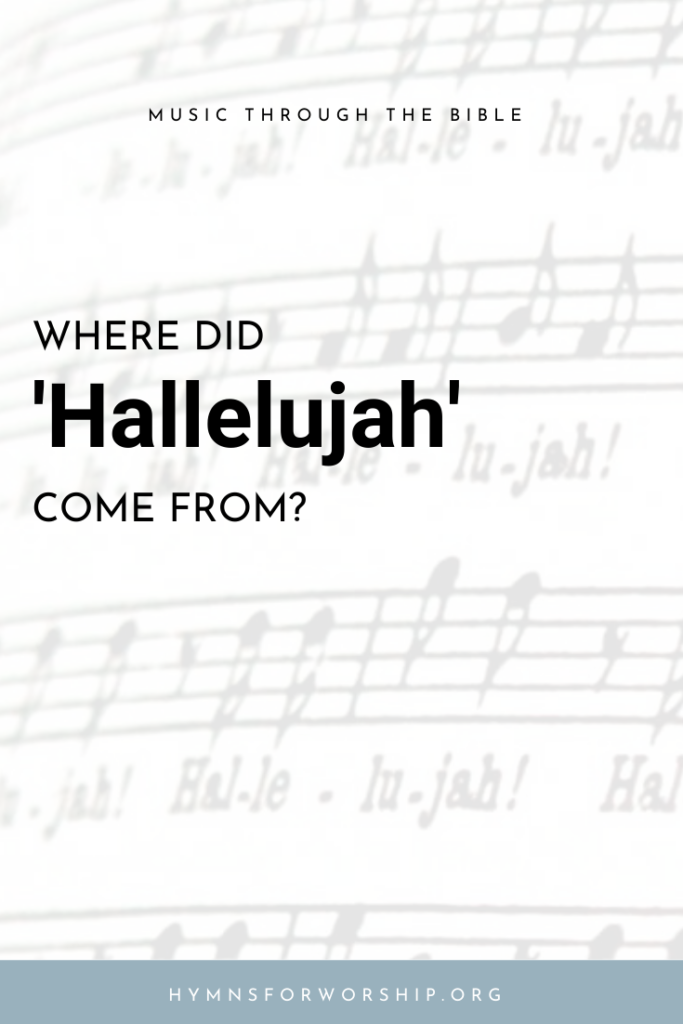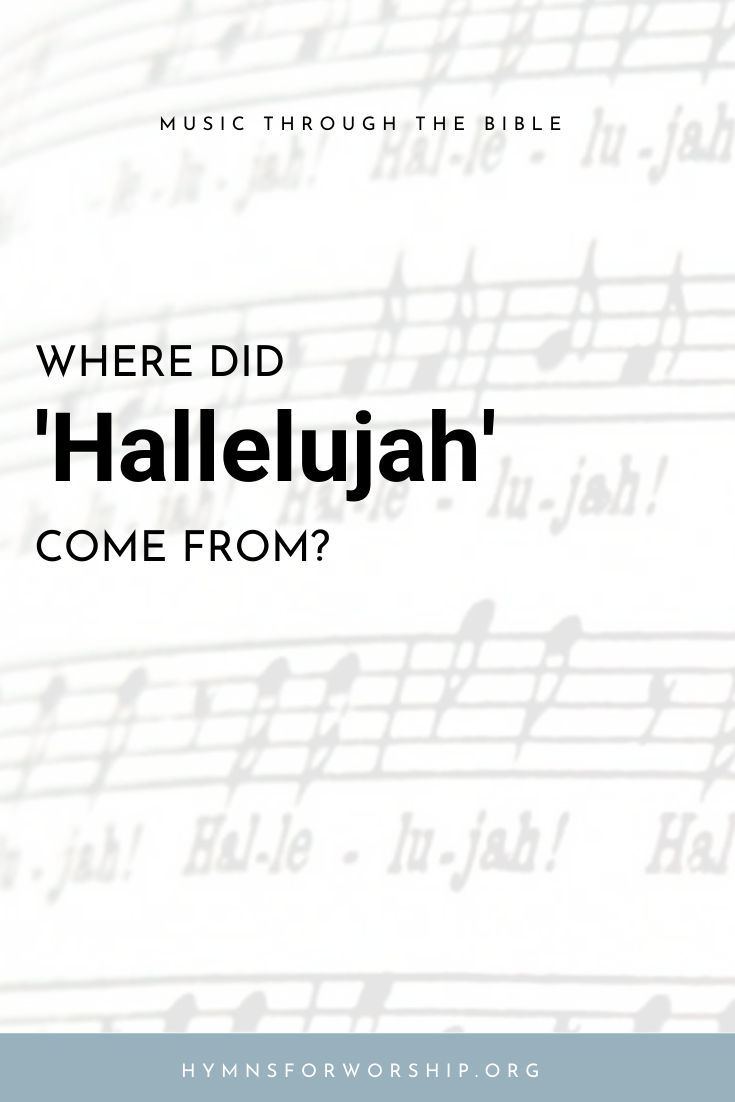
The Hallelujah Chorus is one of the most famous choruses of all time, titled after one of the most commonly used lyrics of all sacred music, a lyric that supersedes language and even religious denomination.
The word ‘hallelujah’ is an intriguing one. Though it is a Hebrew word that means ‘praise the Lord,’ it is usually never translated. We state it in its natural Hebrew form, and that is true for every language that it’s used. Sure, the transliteration or the spelling can vary from language to language depending on the alphabet, but the pronunciation remains as the original Hebrew.
For example,
Aleluya (Spanish)
Alleluia (Latin)
Alléluia (French)
Halleliwia (Welsh)
Halleluja (German)
Hareruya (Japanese)
When it comes to music, this Hebrew word has been set by composers for centuries, retaining its original Hebrew form and syllabification. This is partly because hallelujah or alleluia originated as a Hebrew lyric. The genesis of this word or phrase comes from Hebrew psalmody, the worship music of ancient Israel.
Let’s explore its Biblical origins
The God of the Old Testament was usually referred to with the Hebrew word that transliterates into the letters YHWH. Sometimes pronounced Yehovah, but more commonly Yahveh or Yahweh. The syllable of that word that is used in hallelu-jah, is simply ‘jah’ or the first syllable of the word ‘Yah-weh.’
The first time we see this abbreviated version of God’s name is in Psalm. At the exuberant song sung on the eastern shores of the Red Sea after ancient Israel’s miraculous escape from Egypt. Sometimes called the song of Moses or song of the sea:
The Lord (Yah) is my strength and song, and he is become my salvation: he is my God, and I will prepare him an habitation; my father’s God, and I will exalt him. (Exodus 15:1)
This is a befuddling expression to many commentators. ‘God is strength’ is more logically perceived but how can God be a song? Does it mean He is synonymous with powerful music or perhaps it means God’s strength is the subject of the song. It could simply be the composer attributing both his strength and musical prowess to God. What’s more, the phrase ‘The Lord is my strength and song’ appears in two other places in the Bible as sort of a recurring refrain or anthem for God’s people.
Psalm 118:14 The LORD is my strength and song, and is become my salvation.
Isaiah 12:2 Behold, God is my salvation; I will trust, and not be afraid: for the LORD JEHOVAH is my strength and my song; he also is become my salvation.
At any rate, what we do know about this phrase is that the word used for Lord here is the lesser used of the Hebrew word’s translated as Lord.
Not ‘Yahweh’ but ‘Yah.’ Sometimes transliterated as ‘Jah.’
A tradition used in Psalms
This name is used in the song of Moses, but most often it’s found in the Psalms, in the worship music of the nation. It is typically used in the context of singing God’s name. And it is the name of God used in the popular Hebrew expression, ‘praise ye the Lord,’ or hallelujah.
So it’s Hallelujah not Halleluyahweh. You can find this shortened sung name for God in Psalm 68. And in the KJV, the translators don’t actually translate the word ‘Yah.’ It’s simply transliterated into the letters Jah.
Psalm 68:4 “Sing unto God, sing praises to His name: extol Him that rideth upon the heavens by His name JAH, and rejoice before Him.”

Again, the KJV translators merely transliterated the Hebrew name for God rather than translating it Lord. This shows how heavily associated this particular name of God is with singing.
We are to extol God by His name JAH. Regardless of time period and religion, people have continued to extol God by His name ‘Jah’ in the Hebrew phrase ‘Hallelujah.’
The word Jah is used later in Psalm 68:18, and it is translated into the English ‘Lord.’
Psa 68:18 Thou hast ascended on high, thou hast led captivity captive: thou hast received gifts for men; yea, for the rebellious also, that the LORD God might dwell among them.
And it’s used in 40 other instances throughout the Psalms. In more than half of those instances, it’s used in conjunction with the Hebrew ‘hallal’ so we see it in its commonly sung form of ‘hallelujah’ in those instances.
A musical version of God’s name
This abbreviated musical version of God’s name is found in Hezekiah’s song, thanking God for healing of a terminal illness. You read it in Isaiah 12:2, incorrectly translated as Jehovah.
Interestingly this song in Isaiah carries a lot of parallels to the song of the Red Sea. Isaiah’s rendition depicts the rejoicing that follows Israel’s escape from some future captivity. In the final verses of Isaiah 11, God likens their journey out of this future tribulation to that of the Israelite’s coming out of Egypt.
Isaiah 11:15 And the LORD shall utterly destroy the tongue of the Egyptian sea; and with his mighty wind shall he shake his hand over the river, and shall smite it in the seven streams, and make men go over dryshod.
Isaiah 11:16 And there shall be an highway for the remnant of his people, which shall be left, from Assyria; like as it was to Israel in the day that he came up out of the land of Egypt.
Isaiah 12:1 And in that day thou shalt say, O LORD, I will praise thee: though thou wast angry with me, thine anger is turned away, and thou comfortedst me.
Isaiah 12:2 Behold, God is my salvation; I will trust, and not be afraid: for the LORD JEHOVAH is my strength and my song; he also is become my salvation.
Interestingly, the Hebrew for Jehovah is just JAH. So it’s a similar wording as the Song of the Red Sea back in Exodus 15. God is praised as Israel’s strength and their song and it’s this abbreviated version of His name. Or we could say this musical or lyrical version of God’s name.
Again the fact that God’s name JAH is so commonly referred to in singing sheds more light on how the Hebrew expression ‘hallelujah’ has continued in its original form since Biblical times, and is still used as a means of extolling God’s name today.
For centuries, this word can be heard in the synagogues of the Jews, the cathedrals of various Christian denominations, and the temples of Eastern Orthodoxy.
In the context of the New Testament
In the New Testament, the word is found transliterated into Greek in the book of Revelation. In John’s vision of God’s throne room, in the part of the vision where Jesus takes the helm of world leadership, he hears the voice of the great multitude giving off the sound of many waters uttering a refrain using the Hebrew phrase, “Hallelujah.”
In fact, the most famous setting of this word is a setting that comes from this account in Revelation 19: 1-6 reads:
And after these things I heard a great voice of much people in heaven, saying, Alleluia; Salvation, and glory, and honour, and power, unto the Lord our God:
For true and righteous are his judgments: for he hath judged the great whore, which did corrupt the earth with her fornication, and hath avenged the blood of his servants at her hand.
And again they said, Alleluia. And her smoke rose up for ever and ever.
And the four and twenty elders and the four beasts fell down and worshipped God that sat on the throne, saying, Amen; Alleluia.
And a voice came out of the throne, saying, Praise our God, all ye his servants, and ye that fear him, both small and great.
And I heard as it were the voice of a great multitude, and as the voice of many waters, and as the voice of mighty thunderings, saying, Alleluia: for the Lord God omnipotent reigneth.
Handel’s Hallelujah
The most well-known setting of this word was written in the musical period known as the Baroque era, and is part of a large choral orchestral work known as Messiah. This Hallelujah chorus concludes the segment.
King George II stood up during the Hallelujah movement, and when the king stands so does everybody else. No one knows exactly why, but the conventional wisdom was the king was so moved by the grandeur of the music that he stood up. Someone said he was standing to honour the king being sung about in the chorus itself, the King of Kings and Lord of Lords. And because of George II’s actions of the 1743 London debut, audiences to this day continue to stand in performances of Messiah when this movement is sung.
The second interesting fact about this chorus comes from a quote of Handel himself. After writing the Hallelujah movement, the composer was quoted as saying, “I did think, I did see all heaven before me, the great God Himself.”
Famous Hallelujah settings in Western music history
- Medieval: Alleluia (Plainchant)
- Renaissance: Orlando d’ Lasso’s “Alleluia laus et gloria” (Motet) Alleluia, praise and glory and power be to our God, His judgments are true and just. Alleluia. (Choir of Trinity College, Cambridge)
- Baroque: Handel’s Esther, HWV 50b: Act I Scene 1: Alleluia (Oratorio), first English oratorio written in 1718.
- Classical: Mozart’s Exultate Jubilate, Alleluia
- Classical: Beethoven “Christ on the Mount of Olives,” finale Hallelujah chorus — “Hallelujah unto God’s almighty Son. Praise the Lord ye bright angelic hosts in choirs in holy songs of joy, and proclaim His grace and glory. Hallelujah unto God’s Almighty Son.”
- Romantic: Rachmaninoff’s The Vespers (All-Night Vigil) Opus 37: Praise the name of the Lord. Alleluia.
- Modern: Randall Thompson’s “Alleluia” Lento (very slow), ‘The music in my Alleluia cannot be made to sound joyous. Here it is comparable to the book of Job where it is written, ‘the Lord gave and the Lord has taken away. Blessed be the name of the Lord,” (Thompson). Listen also to Eric Whitacre’s “Alleluia”.
What do you think of the musical amalgamation of Alleluia throughout the centuries? Why do you think this word transcended the bounds of religion, race and time? Let me know your comments below!


